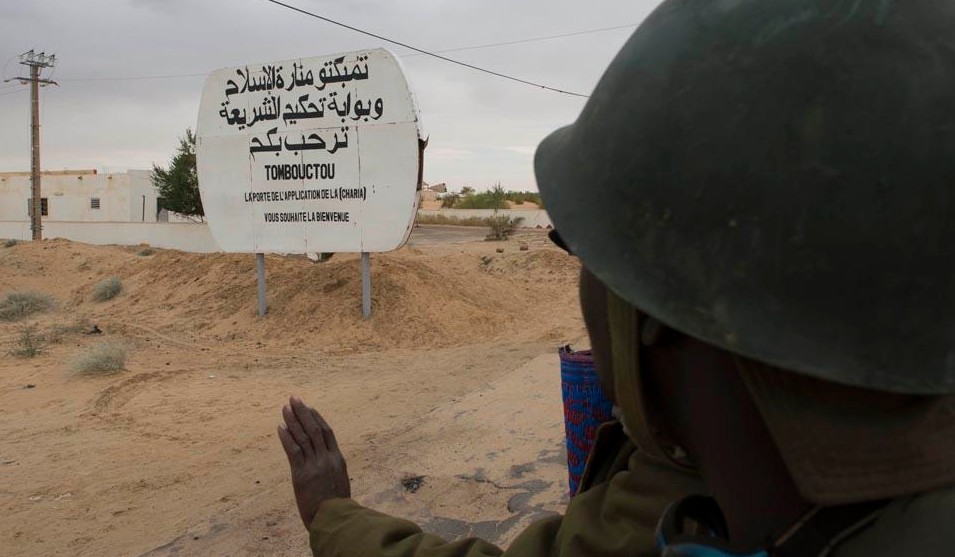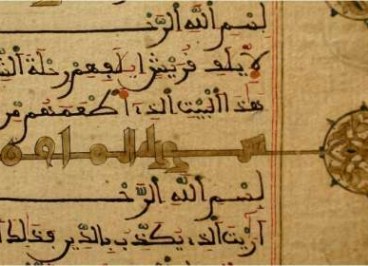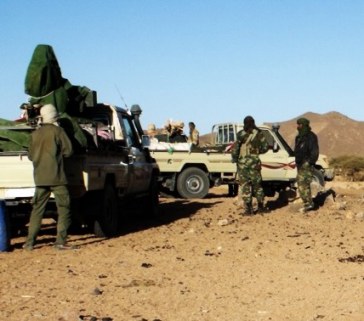 French and Malian troops reaching the airport of Timbuktu, Mali © afrol News/EMA/ECPA-D/Ministère de la DéfenseSociety | Culture - Arts | Politics Timbuktu: Historic manuscripts may be safe
The French Ministry of Defence yesterday reported that French and Malian forces had taken control over the most famous icon of Mali, the historic town of Timbuktu. The few remaining citizens accordingly were celebrating in the streets after the extreme Islamists had been chased out of town after a full year of terror.
Several private library owners in Timbuktu further reported to Malian media that they had brought their manuscripts to safety at secret stores before and during the terrorist attack. They quoted fears of destruction orders and looting. Even shortly after the liberation by French troops, there emerged little concrete information about the state of the Timbuktu manuscripts. The French Defence Ministry did not issue any information about the Ahmed Baba Institute. Soldiers were concentrating on the airport, communication in and out of Timbuktu and the possible disarmament of munitions and explosives, Paris reported. But first reports from Malian media were dramatic. It was said the Ahmed Baba Institute was lit afire by the Islamists before fleeing the town. The mayor of Timbuktu, Hallé Ousmane, who remains at his Bamako refuge, confirmed these reports to 'Radio France Internationale' (RFI). The first journalists arriving Timbuktu with French troops gave a somewhat less dramatic picture, but confirmed documents had been relocated from the institute or burnt a few days ago. Only empty binders were left. Locals meanwhile reported the Ahmed Baba Institute had been used as a dorm by the Islamist warriors. The Director of the institute, Gallah Dicko, today even made more positive statements, saying that only a limited part of the manuscripts had been transported to the new building. Many were still in the old home of the institute and there were no reports of vandalism at that location. According to Mr Dicko, the hard discs with digital copies of the manuscripts had been taken to Bamako, meaning that there would be copies of most of the lost originals. According to the 'BBC', which had been interviewing employees of the Ahmed Baba Institute in Bamako, most of the original manuscript should even be safe. An estimated 28,000 old manuscripts had been smuggled to Bamako by workers prior to attack, and "only" some 2,000 had been left in the Timbuktu central. But this is still to be confirmed by other sources. Malian media still report that most of this cultural treasure has been burned. No employees as yet have returned to Timbuktu, and neither the institute's international partners nor UNESCO have sent missions to town. So far. By staff writer © afrol News - Create an e-mail alert for Mali news - Create an e-mail alert for Society news - Create an e-mail alert for Culture - Arts news - Create an e-mail alert for Politics news
On the Afrol News front page now
|
front page
| news
| countries
| archive
| currencies
| news alerts login
| about afrol News
| contact
| advertise
| español
©
afrol News.
Reproducing or buying afrol News' articles.
You can contact us at mail@afrol.com









